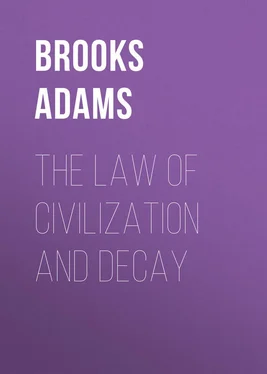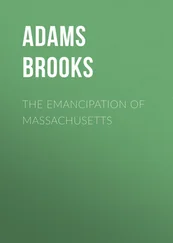Brooks Adams - The Law of Civilization and Decay
Здесь есть возможность читать онлайн «Brooks Adams - The Law of Civilization and Decay» — ознакомительный отрывок электронной книги совершенно бесплатно, а после прочтения отрывка купить полную версию. В некоторых случаях можно слушать аудио, скачать через торрент в формате fb2 и присутствует краткое содержание. Жанр: foreign_antique, foreign_prose, на английском языке. Описание произведения, (предисловие) а так же отзывы посетителей доступны на портале библиотеки ЛибКат.
- Название:The Law of Civilization and Decay
- Автор:
- Жанр:
- Год:неизвестен
- ISBN:нет данных
- Рейтинг книги:4 / 5. Голосов: 1
-
Избранное:Добавить в избранное
- Отзывы:
-
Ваша оценка:
- 80
- 1
- 2
- 3
- 4
- 5
The Law of Civilization and Decay: краткое содержание, описание и аннотация
Предлагаем к чтению аннотацию, описание, краткое содержание или предисловие (зависит от того, что написал сам автор книги «The Law of Civilization and Decay»). Если вы не нашли необходимую информацию о книге — напишите в комментариях, мы постараемся отыскать её.
The Law of Civilization and Decay — читать онлайн ознакомительный отрывок
Ниже представлен текст книги, разбитый по страницам. Система сохранения места последней прочитанной страницы, позволяет с удобством читать онлайн бесплатно книгу «The Law of Civilization and Decay», без необходимости каждый раз заново искать на чём Вы остановились. Поставьте закладку, и сможете в любой момент перейти на страницу, на которой закончили чтение.
Интервал:
Закладка:
Henry marched on Italy, but in all European history there has been no drama more tremendous than the expiation of his sacrilege. To his soldiers the world was a vast space, peopled by those fantastic beings which are still seen on Gothic towers. These demons obeyed the monk of Rome, and his army, melting from the emperor under a nameless horror, left him helpless.
Gregory lay like a magician in the fortress of Canossa; but he had no need of carnal weapons, for when the emperor reached the Alps he was almost alone. Then his imagination also took fire, the panic seized him, and he sued for mercy.
For three days long he stood barefoot in the snow at the castle gate; and when at last he was admitted, half-naked and benumbed, he was paralyzed rather by terror than by cold. Then the great miracle was wrought, by which God was made to publicly judge between them.
Hildebrand took the consecrated wafer and broke it, saying to the suppliant, “Man’s judgments are fallible, God’s are infallible; if I am guilty of the crimes you charge me with, let Him strike me dead as I eat.” He ate, and gave what remained to Henry; but though for him more than life was at stake, he dared not taste the bread. From that hour his fate was sealed. He underwent his penance and received absolution; and when he had escaped from the terrible old man, he renewed the war. But the spell was over him, the horror clung to him, even his sons betrayed him, and at last his mind gave way under the strain and he abdicated. In his own words, to save his life he “sent to Mayence the crown, the sceptre, the cross, the sword, the lance.”
On August 7, 1106, Henry died at Liège, an outcast and a mendicant, and for five long years his body lay at the church door, an accursed thing which no man dared to bury.
Such was the evolution of the mediæval theocracy, the result of that social disintegration which stimulates the human imagination, and makes men cower before the unknown. The force which caused the rise of an independent priesthood was the equivalent of magic, and it was the waxing of this force through the dissolution of the Empire of the West which made the schism which split Christendom in two. The Latin Church divided from the Greek because it was the reflection of the imaginative mind. While the West grew emotional, Constantinople stayed the centre of exchanges, the seat of the monied class; and when Cluny captured Rome, the antagonism between these irreconcilable instincts precipitated a rupture. The schism dated from 1054, five years after the coronation of Leo. Nor is the theory new; it was explained by Gibbon long ago.
“The rising majesty of Rome could no longer brook the insolence of a rebel; and Michael Cerularius was excommunicated in the heart of Constantinople by the pope’s legates…
“From this thunderbolt we may date the consummation of the schism. It was enlarged by each ambitious step of the Roman pontiffs; the emperors blushed and trembled at the ignominious fate of their royal brethren of Germany; and the people were scandalized by the temporal power and military life of the Latin clergy.” 99 99 Decline and Fall , ch. lx.
CHAPTER III
THE FIRST CRUSADE
Until the mechanical arts have advanced far enough to cause the attack in war to predominate over the defence, centralization cannot begin; for when a mud wall can stop an army, a police is impossible. The superiority of the attack was the secret of the power of the monied class who controlled Rome, because with money a machine could be maintained which made individual resistance out of the question, and revolt difficult. Titus had hardly more trouble in reducing Jerusalem, and dispersing the Jews, than a modern officer would have under similar circumstances.
As the barbarians overran the Roman provinces, and the arts declined, the conditions of life changed. The defence gained steadily on the attack, and, after some centuries, a town with a good garrison, solid ramparts, and abundant provisions had nothing to fear from the greatest king. Even the small, square Norman tower was practically impregnable. As Viollet-le-Duc has explained, these towers were mere passive defences, formidable to a besieger only because no machinery existed for making a breach in a wall. The beleaguered nobles had only to watch their own men, see to their doors, throw projectiles at the enemy if he approached too near, counter-mine if mined, and they might defy a great army until their food failed. Famine was the enemy most feared. 100 100 Dictionnaire de l’Architecture , v. 50.
By the eleventh century these towers had sprung up all over the West. Even the convents and churches could be defended, and every such stronghold was the seat of a count or baron, an abbot or bishop, who was a sovereign because no one could coerce him, and who therefore exercised all the rights of sovereignty, made war, dispensed justice, and coined money. In France alone there were nearly two hundred mints in the twelfth century.
Down to the close of the Merovingian dynasty the gold standard had been maintained, and contraction had steadily gone on; but, for reasons which are not understood, under the second race, the purchasing power of bullion temporarily declined, and this expansion was probably one chief cause of the prosperity of the reign of Charlemagne. Perhaps the relief was due to the gradual restoration of silver to circulation, for the coinage was then reformed, and the establishment of the silver pound as the measure of value may be considered as the basis of all the monetary systems of modern Europe.
The interval of prosperity was, however, brief; no permanent addition was made to the stock of precious metals, and prices continued to fall, as is demonstrated by the rapid deterioration of the currency. In this second period of relapse disintegration reached its limit.
During the tenth and eleventh centuries the Northmen infested the coasts of France, and sailed up the rivers burning and ravaging, as far as Rouen and Orléans. Even the convents of Saint Martin of Tours and Saint Germain des Près were sacked. The Mediterranean swarmed with Saracenic corsairs, who took Fraxinetum, near Toulon, seized the passes of the Alps, and levied toll on travel into Italy. The cannibalistic Huns overran the Lower Danube, and closed the road to Constantinople. Western Europe was cut off from the rest of the world. Commerce nearly ceased – the roads were so bad and dangerous, and the sea so full of pirates.
The ancient stock of scientific knowledge was gradually forgotten, and the imagination had full play. Upon philosophy the effect was decisive; Christianity sank to a plane where it appealed more vividly to the minds of the surrounding pagans than their own faiths, and conversion then went on rapidly. In 912 Rollo of Normandy was baptized; the Danes, Norwegians, Poles, and Russians followed; and in 997 Saint Stephen ascended the throne of Hungary and reopened to Latin Christians the way to the Sepulchre.
Perhaps the destiny of modern Europe has hinged upon the fact that the Christian sacred places lay in Asia, and therefore the pilgrimage brought the West into contact with the East. But the pilgrimage was the effect of relic-worship, and relic-worship the vital principle of monasticism. In these centuries of extreme credulity monasticism had its strongest growth. A faculty for scientific study was abnormal, and experimental knowledge was ascribed to sorcery. The monk Gerbert, who became pope as Sylvester II., was probably the most remarkable man of his generation. Though poor and of humble birth, he attracted so much attention that he was sent to Spain, where he studied in the Moorish schools at Barcelona and Cordova, and where he learned the rudiments of mathematics and geography. His contemporaries were so bewildered by his knowledge that they thought it due to magic, and told how he had been seen flying home from Spain, borne on the back of the demon he served, and loaded with the books he had stolen from the wizard, his master. Sylvester died in 1003, but long afterwards anatomy was still condemned by the Church, and four separate councils anathematized experimental medicine, because it threatened to destroy the value of the shrines. The ascendency of Cluny began with Saint Hugh, who was chosen abbot in 1049, the Year Leo’s election. The corporation then obtained control of Rome, and in another twenty-five years was engaged in its desperate struggle with the remains of the old secular police power. But though Hildebrand crushed Henry, the ancient materialism was too deeply imbedded to be eradicated in a single generation, and meanwhile the imagination had been brought to an uncontrollable intensity. A new and fiercer excitement seethed among the people – a vision of the conquest of talismans so powerful as to make their owners sure of heaven and absolute on earth.
Читать дальшеИнтервал:
Закладка:
Похожие книги на «The Law of Civilization and Decay»
Представляем Вашему вниманию похожие книги на «The Law of Civilization and Decay» списком для выбора. Мы отобрали схожую по названию и смыслу литературу в надежде предоставить читателям больше вариантов отыскать новые, интересные, ещё непрочитанные произведения.
Обсуждение, отзывы о книге «The Law of Civilization and Decay» и просто собственные мнения читателей. Оставьте ваши комментарии, напишите, что Вы думаете о произведении, его смысле или главных героях. Укажите что конкретно понравилось, а что нет, и почему Вы так считаете.












